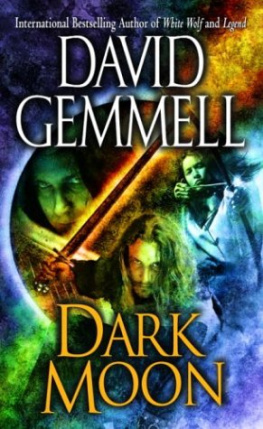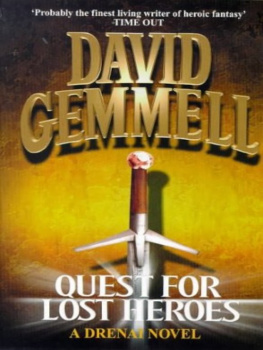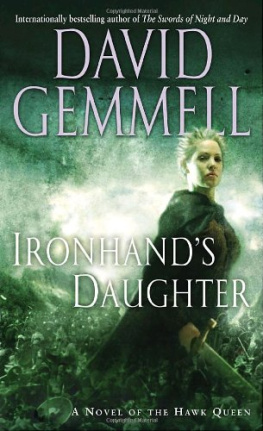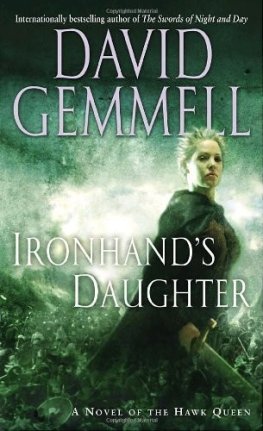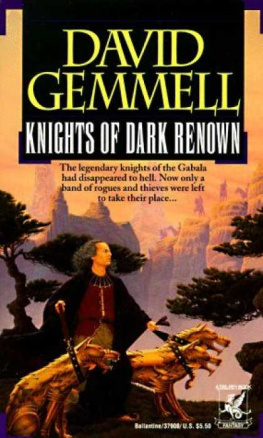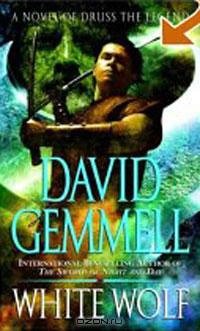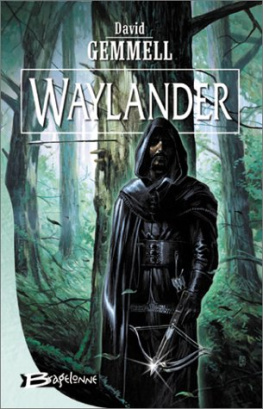The moon hung like a sickle blade over Dros Delnoch and Pellin stood quietly staring down at the Nadir camp in the lunar light below. Thousands of warriors were gathered there, and tomorrow they would come screaming across the narrow strip of blood-stained ground, hauling their ladders, carrying their grappling irons. They would be baying for battle and death, and just like today the sound would terrify him, seeming to penetrate his skin like needles of ice. Pellin was more frightened than he had ever been in his young life, and he longed to run, to hide, to throw away his ill-fitting armour, and race south to his home. The Nadir kept coming, wave after wave, their raucous battle cries sending their hatred ahead of them. The shallow wound in his upper left arm was both throbbing and itching. Gilad had assured him this meant that it was healing well. But it had been a taste of pain, a bitter promise of worse pain to come. He had watched comrades writhing and screaming, their bellies opened by serrated swords. . Pellin fought to push the memories away. A cold wind began to blow from the north, bunching dark rain-clouds before it. He shivered, and remembered his warm farmhouse with its thatched roof and large stone-built fireplace. On cold nights like this one he and Kara would lie in bed, her head resting on his shoulder, her left leg warm on his thighs. They would lie together in the soft red glow of the fading fire, and listen to the wind howling mournfully outside. Pellin sighed. 'Please don't let me die here,' he prayed.
Of the twenty-three men who had volunteered from his village, only nine were left. He gazed back at the rows of sleeping defenders, lying on the open ground between Walls Three and Four. Could these few hold the greatest army ever assembled? Pellin knew they could not.
Returning his gaze to the Nadir camp, he scanned the area close to the mountains. The Drenai dead, stripped of armour and weapons, had been thrown there, and burnt. Oily black smoke had drifted over the Dros for hours afterwards, bringing with it the sickly and nauseating smell of roasting flesh. 'It could have been me,' thought Pellin, remembering the slaughter as Wall Two fell.
He shivered. Dros Delnoch, the mightiest fortress in all the world: six walls of rearing stone, and a broad keep. Never had she been conquered by an enemy. But then never had she faced an army of such numbers. It seemed to Pellin that there were more Nadir than there were stars in the sky. The defenders had fallen back from Wall One after bitter righting, for it was the longest and therefore the hardest to hold. They had crept back in the night, surrendering the wall without further losses. But Wall Two had been taken at great cost, the enemy breaching the defences and sweeping forward to encircle the defenders. Pellin had barely made it back to Wall Three, and remembered the acid taste of fear in his throat, and the terrible shaking of his limbs as he hauled himself over the battlements and sank to the ramparts.
And what was it all for, he wondered? What difference would it make if the Drenai enjoyed self-rule, or government by the Warlord, Ulric? Would the farm yield any less corn? Would his cattle sicken and die?
It had all seemed such an adventure twelve weeks ago, when the Drenai recruiting officers had arrived at the village. A few weeks of patrolling these great walls, and then a return home as heroes.
Heroes! Sovil was a hero until that arrow pierced his eye, ripping it from the socket. Jocan was a hero as he lay screaming, his blood-covered hands seeking to hold his entrails in place.
Pellin added a little coal to the iron brazier and waved at the sentry thirty paces to the left. The man was stamping his feet against the cold. He and Pellin had swapped places an hour before, and soon it would be his turn to stand by the brazier. The knowledge of heat soon to be lost gave the fire an even greater significance, and Pellin stretched out his hands, enjoying the warmth.
A huge figure moved into sight, stepping carefully over the sleeping defenders and making his way towards the ramparts. Pellin's heart began to beat faster as Druss strode up the steps.
Druss the Legend, the Saviour of Skein Pass, the man who had battled his way across the world to rescue his wife. Druss the Axeman, the Silver Slayer. The Nadir called him Deathwalker, and Pellin now knew why. He had watched him fighting on the battlements, his terrible axe cleaving and slaying. He was not mortal; he was a dark god of war. Pellin hoped the old man would stay away from him. What could a novice soldier find to say to a hero like Druss? To Pellin's great relief the Legend stopped by the other sentry, and the two men began to talk; he could see the sentry moving nervously from foot to foot as the old warrior spoke to him.
It struck him then that Druss was the human embodiment of this ancient fortress, unbeaten and yet eroded by time; less than he was, but magnificent for all that. Pellin smiled as he remembered the Nadir herald giving Druss the ultimatum of surrender or die. The old hero had laughed. 'In the north,' he said, 'the mountains may tremble when Ulric breaks wind. But this is Drenai land and to me he is just another pot-bellied savage who couldn't wipe his arse without a Drenai map tattooed on his thigh.'
Pellin's smile faded as he saw Druss clap the other sentry on the shoulder and move on towards him. The rain had eased, and the moon shone bright once more. Pellin's hands began to sweat and he wiped the palms on his cloak. The young sentry stood to attention as the Legend approached him, striding along the ramparts, his axe shining silver in the bright moonlight. Pellin's mouth was dry as he stood, fist clenched against his breastplate, to salute him. 'Relax, laddie,' said Druss, laying the mighty axe on the ramparts. The old warrior stretched his huge hands to the brazier, warming them, then sat with his back to the wall, beckoning the youth to join him. Pellin had never been this close to Druss, and he saw now the lines of age etched deep into his broad face, giving it the look of ancient granite. The eyes were bright and pale, though, beneath heavy brows, and Pellin found he could not stare into them. 'They'll not come tonight,' said Druss. 'Just before first light they'll rush in. No war cries; it will be a silent assault.'
'How do you know that, sir?'
Druss chuckled. 'I'd like to tell you that my vast knowledge of war leads me to that conclusion, but the answer is more simple. The Thirty predict it, and they're a canny bunch. Normally I have little time for wizards and such, but these lads are great fighters.' He lifted his black helm clear of his head and ran his fingers through his thick white hair. 'Served me well, this helm,' he told Pellin, twirling it so that moonlight shone upon the silver axe motif on the brow. 'And I don't doubt it will do its job tomorrow.'
At the thought of the battle to come Pellin cast a nervous glance over the wall, to where the Nadir waited. From here he could see many of them lying in their blankets, close to hundreds of camp-fires. Others were awake, sharpening weapons or talking in small groups. The young man turned and ran his gaze over the exhausted Drenai defenders lying on the ground behind the ramparts, wrapped in their blankets, trying to snatch a few hours of precious, refreshing sleep. 'Sit down, laddie,' said Druss. 'You can't worry them away.'
Resting his spear against the wall the sentry sat. His scabbard clanged against the stone, and clumsily he swivelled it. 'I cannot get used to wearing all this armour,' said Pellin. 'I trip over the sword all the time. I am not much of a soldier, I fear.'
'You looked every inch the soldier three days ago on Wall Two,' said Druss. 'I saw you kill two Nadir, then fight your way back to the ropes on this wall. Even then you helped a comrade who had a wound in his leg you climbed below him, supporting him.'


